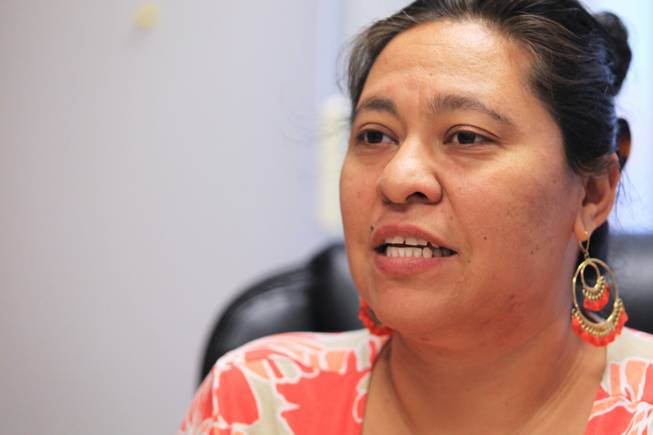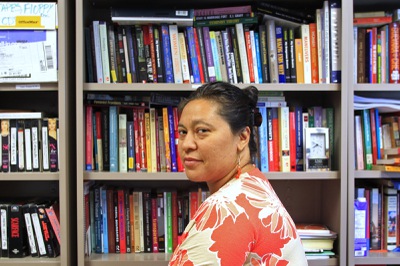Thursday, June 7, 2012 | 2 a.m.
Sun Archives
Students who were the driving force behind a 2006 march that drew thousands to the Las Vegas Strip in support of immigrant rights are the focus of a new book being written by the director of UNLV’s women’s studies program.
UNLV professor Anita Tijerina Revilla was a co-editor of the book “Marching Students: Chicana Activism in Education, 1968 to the Present” that chronicled the 1968 student walkouts in Los Angeles and how they affected participants and future activism. She authored the book’s chapter on the Las Vegas Activist Crew, a group of students behind the May Day 2006 march that flooded the Strip with tens of thousands of people.
Revilla is now writing a book on the Activist Crew, and she said just as the 1968 student walkouts in Los Angeles had profoundly affected participants and the community, so did Las Vegas’ 2006 march and a series of preceding student walkouts.
The book will be titled “What Happens in Vegas Does Not Stay in Vegas: Social Justice Activism in Las Vegas.” Revilla will be working on it, as well as another book on activism in Los Angeles, during an upcoming sabbatical.
Revilla was born into “extreme poverty” in 1973 in San Antonio. Her father died when she was 8 years old, and her mother obtained her GED and worked as a security guard to support Revilla and her two siblings. Revilla eventually went to Princeton University, the first in her family to go to college and the only one to finish.
“Once I got to Princeton, I took a class called Latinos in the United States, and it helped me understand my experience growing up in terms of racism, classism and sexism,” Revilla said. “I also met a classmate who told me, ‘I’ve never met someone from the working class before.’ Obviously, he had had to, but there was a huge disconnect there. It was like saying, ‘I don’t understand your reality.’ ”
Revilla, who attended Princeton from 1991 to 1995, felt ostracized and unwanted at times and said some white students would talk to her during meetings for organizations, then shun her in public.
She studied religion because the only tenured Latino professor at Princeton at the time was in the religion department. She also became active in social justice organizations and took African-American studies courses, as she saw them as more reflective of her experience as a Hispanic in Texas.
Her own life and education would later help frame her perceptions of both the Los Angeles and Las Vegas movements. During the 1968 Los Angeles walkouts, black students marched in solidarity with Latino students, and while organizing for the 2006 march in Las Vegas, student leaders helped bridge generational gaps and brought together various groups under one social justice banner.
When Revilla came to UNLV in 2004, she found students still struggling with similar issues and a campaign to have a department dedicated to fostering diversity on campus.
In 2005, the U.S. House of Representatives passed HR4437, the Border Protection, Anti-terrorism and Illegal Immigration Control Act, which, among other actions, called for a 700-mile border fence and criminalized aid to immigrants without a legal status.
The Senate never approved the bill, but the proposal mobilized immigrant rights groups and led to marches all over the country in early 2006. It was then that one of Revilla’s students, Evelyn Median, coined the term “citizenism.” Together, Revilla and her student fleshed out the term, which they use to describe subordination of noncitizens and the ideology that citizens are inherently superior to noncitizens, who are undeserving of certain rights and privileges that citizens enjoy.
“She was one of the students I mentored, and she came to me after HR4437 passed and said, ‘This is not racism. This is not classism. It’s citizenism. It’s discrimination against any person who is not a citizen and a belief that citizens are superior. ... I would argue it’s akin to white superiority.”
Activists saw the hardline approach of HR4437 as scapegoating and akin to previous discrimination against Chinese, Jewish and Irish immigrants, Revilla said.
“People would say undocumented immigrants should ‘get in line,’ ” Revilla said. “What line? Those who we are talking about either don’t qualify to even get in line or the line is 20 years long.”
In March 2006, HBO released a documentary on the 1968 student walkouts in Los Angeles, and students in Las Vegas and around the country took inspiration from the movement, Revilla said.
The Las Vegas Activist Crew, a loosely formed group of students (from all levels) and community activists, was integral in organizing many of the events that followed and led to a march of thousands on the Strip on May 1, 2006. On March 28 and 31, 2006, there were two citywide student walkouts, an unprecedented occurrence in Las Vegas history, according to Revilla.
It was also a watershed moment in Las Vegas social justice activism, as the Activist Crew worked to eliminate barriers between different organizations. Youths took the reins of the movement and, over the protests of some of the “elders,” integrated new ideologies, the gay rights community and labor advocates into the network.
Just as interviews with the participants of the Los Angeles protests showed many saw the walkouts as a defining moment that frames how they live and see the world today, Revilla’s interviews with the 2006 Las Vegas activists reveal similar sentiments.
While the May Day march this year drew between just 150 and 200 people, Revilla said the results are seen elsewhere.
“The massive protests happen out of desperation,” Revilla said. “Later, the actors will refocus their energies on other areas, maybe on education, family, work or research. But there is an incredible ripple effect in which these movements influence their lives going forward. Las Vegas is connected to broader social movements nationally now because of some of the Activist Crew organizers.”
In May 2006, soon after one of the largest series of protests in Las Vegas history, UNLV opened its Office of Student Diversity Programs and Services.
“Things do change, just not as fast as some would like,” Revilla said, discussing how many of the issues students protest today are similar to the ones from the 1968 Los Angeles demonstrations. “People want massive change, but it rarely happens that way. It doesn’t happen on the grand scale folks are expecting, but the changes do occur.”



Join the Discussion:
Check this out for a full explanation of our conversion to the LiveFyre commenting system and instructions on how to sign up for an account.
Full comments policy